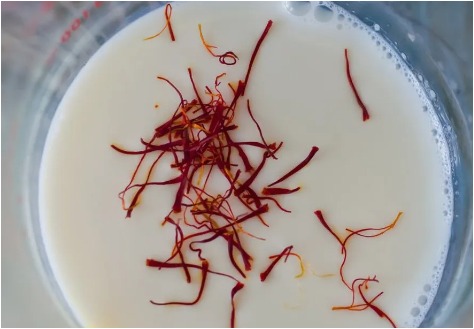
Saffron, also known as Kesar, is a spice derived from the flower of Crocus sativus. It is one of the most expensive spices in the world and has been used for centuries in traditional medicine and culinary practices. While saffron is generally safe for consumption in moderate amounts during pregnancy, it’s essential for pregnant women to consult with their healthcare provider before adding it to their diet. Here are some potential benefits of saffron for pregnant women:
- Aids Digestion: Saffron has been traditionally used to improve digestion and relieve digestive discomforts such as bloating and gas, which can be beneficial during pregnancy when some women may experience digestive issues.
- Mood Enhancement: Saffron is believed to have mood-enhancing properties and may help alleviate symptoms of mild depression and anxiety. Pregnancy can bring about emotional changes, and consuming saffron in moderation might offer some emotional support.
- Antioxidant Properties: Saffron is rich in antioxidants, such as crocin and safranal, which can help neutralize harmful free radicals in the body. Antioxidants play a crucial role in supporting overall health, including during pregnancy.
- Promotes Sleep: Some studies suggest that saffron may have mild sedative effects, which could help pregnant women improve their sleep quality and address sleep disturbances commonly experienced during pregnancy.
- Immune Support: The antioxidants and other compounds found in saffron may help support the immune system, which is essential during pregnancy to protect both the mother and the developing fetus.
- Preterm Birth Prevention: There is limited evidence to suggest that saffron may help reduce the risk of preterm birth. However, more research is needed in this area.
It’s crucial to note that while saffron can have potential benefits, it should be consumed in moderation during pregnancy. Excessive consumption of saffron may lead to adverse effects. Additionally, pregnant women should avoid taking saffron supplements, as they may contain higher concentrations and pose a risk of overdosing.
As with any dietary supplement or herbal remedy, pregnant women should always consult their healthcare provider before incorporating saffron into their diet or considering any form of supplementation. A healthcare professional can provide personalized advice based on the individual’s health status and specific pregnancy needs.
